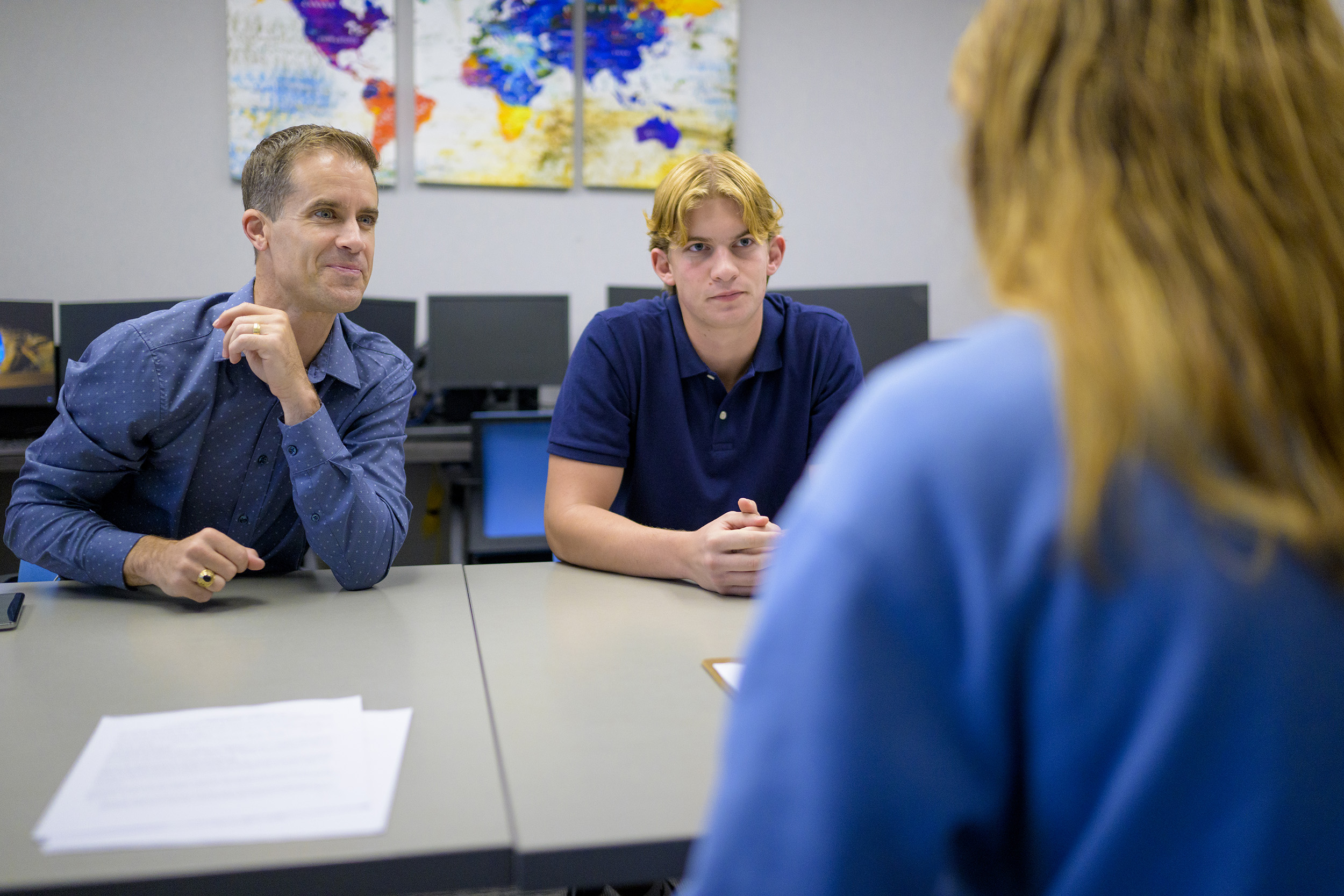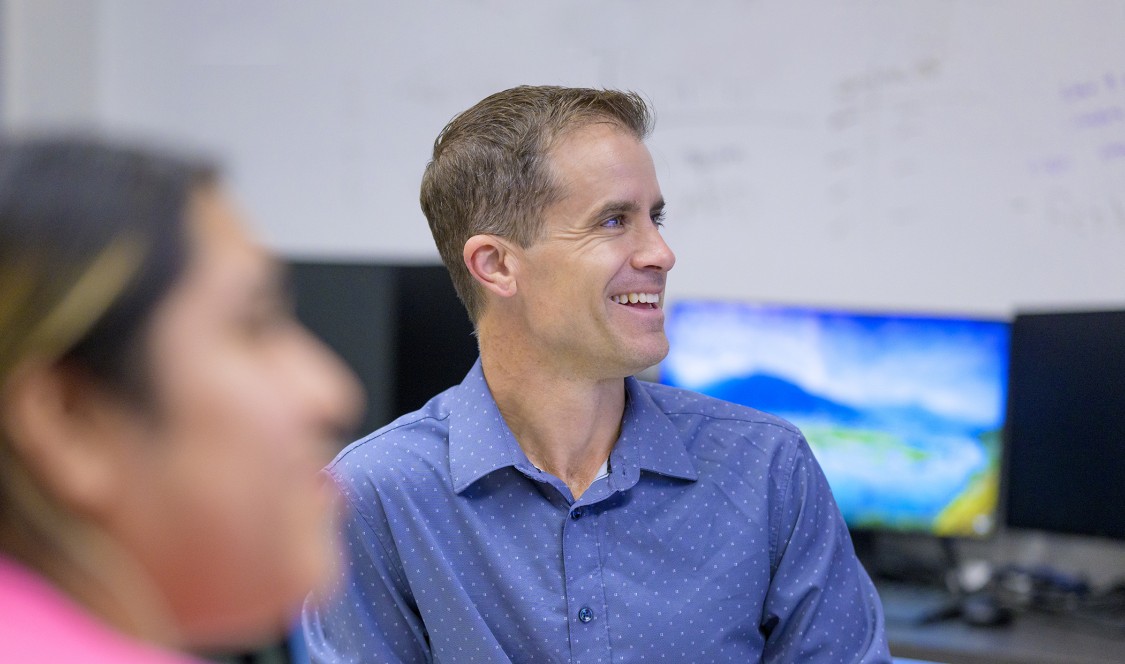A conversation with Annie Lowrey, Atlantic reporter
How can the wealth gap be bridged in America? Is it realistic to fund a meaningful universal basic income? And what are the moral hazards?
CMC Professor Cameron Shelton recently engaged in a discussion with Atlantic journalist Annie Lowrey on these topics and more. Co-sponsored by CMC’s Lowe Institute of Political Economy, where Shelton serves as director, the November 7 discussion at the Athenaeum also delved into a growing concern that artificial intelligence could replace technical jobs, further increasing interest amongst policymakers and scholars.
Lowrey, the author of Give People Money: How a Universal Basic Income Would End Poverty, Revolutionize Work, and Remake the World, met earlier in the day with two groups of aspiring student journalists and was interviewed by student podcasters.
“Thoughtful long-form journalists like Annie Lowrey are engaged in the same enterprise of truth-seeking and insightful analysis that forms the heart of academic inquiry,” said Shelton. “Both the students and I learned a lot from listening to the perspective Ms. Lowrey has developed through sources, methods, and connections that differ greatly from, but are complementary to, the familiar disciplinary approaches modeled on campus.”
To watch the Ath discussion, which was part of the Lowe Institute's Public Policy Speaker Series, please click here.
As the director of CMC’s Lowe Institute of Political Economy and a prolific scholar studying a wide range of topics in politics and economics, Cameron Shelton’s passion is helping students apply their textbook knowledge of economics and statistics to complex real-world problems.
“I have always had a broad range of research interests. I write on a lot of different topics touching on a variety of different fields in economics and political science because I enjoy opportunities to learn new skills and solve different puzzles,” said Shelton who is the McMahon Family Associate Professor of Political Economy and George Roberts Fellow.
The Lowe Institute of Political Economy is one of 11 undergraduate research institutes at CMC, studying the intersection of economics, political science, and public policy and its impact at a regional, statewide, nationwide, and global level. A trusted think tank providing important insights and analysis for government leaders and the public, the Institute has been producing influential faculty-student research for more than 35 years.
From organizational strategy and budget planning to negotiating partnerships with outside institutions and hosting academic conferences for faculty, Shelton loves the multifaceted nature of his work.
He considers his mentorship of students to be his most important role.
“I came to CMC because I wanted to work at an institution of higher education where both teaching and scholarship are valued and emphasized,” said Shelton, who earned his Ph.D. in political economy from the Stanford Graduate School of Business.

Since he took the helm at Lowe in 2016, his priority has been ensuring that every student the Institute employs — typically 45 to 50 students each year — has a meaningful, productive experience. Students work on assembling, manipulating, and curating data, as well as programming, managing the production and writing of major reports for outside audiences on a tight deadline, learning and applying data visualization skills, and learning how to write journalistic pieces on economic research questions.
Shelton, who teaches macroeconomics and political economy courses, often publishes research conducted with students in peer-reviewed journals in both political science and economics.
His research passion is gerrymandering, political competition, political economy, and macroeconomics, but his most recent work broadens a study on political frustration and domestic violence. He collaborated with Anya Syed ’23, an International Relations and Economics major, who is currently working as a political affairs intern at the United Nations Office of the Victims’ Rights Advocate since graduating.
“Comparing neighborhoods in Charleston, S.C., on the week of the 2016 Presidential election, Anya and I found that Republican areas — whose preferred candidate won — evinced a decline in domestic violence in the weeks following the election,” Shelton said.
Syed said the experience “was an incredibly valuable learning opportunity.”
“Professor Shelton encouraged me to combine my interests in women’s rights and politics with statistical analysis,” she added. “His support was instrumental in not only publishing this article but also ensuring I had a strong knowledge of statistical fundamentals.”
Current CMC students Anson Bouchard ’26 and Sarath Kakani ’24 worked this past summer to expand the available data to cover a few dozen cities for both 2016 and 2020. “During the semester, Anson is working to analyze these new data to see whether the effect Anya found is general.”
On his own, Shelton just published an article in the Journal of Public Economics that analyzes the Opportunity Zones policy conceived of by Tim Scott and passed during the Trump Administration. “Basically, governors were allowed to pick which of a set of eligible low-income census tracts would get favorable tax treatment in an attempt to attract investment,” he said. “I looked at how governors chose between eligible districts.”
In another article currently under review, he analyzes the effects of political advertising on the policy positions and voting behavior of American voters. “What I find, unfortunately, is that ads don’t just motivate one side, they also inflame the other. They polarize.,” he said.
Expanding Student Opportunities
Several years ago, Shelton started the Lowe Economic Journalist team to provide annual opportunities for a dozen students to hone their skills in data analysis and visualization while working on subjects closer to their own interests than those typically afforded by faculty research.
“I lead that group myself, attempting each week to demonstrate the principles and practice of data-driven inquiry,” Shelton said.
“For a few years, that extra group was sufficient to employ every single applicant who had met our basic prerequisites for classroom experience,” he added. “But the increasing popularity of data analysis and success of our efforts at on-campus branding and outreach have once again led to the supply of interested, qualified students outstripping my ability to find them meaningful, mentored projects.”
Shelton is working to remedy that situation. Currently, he is focused on a pivot to public policy and signature projects that will bring public recognition for the Lowe Institute and CMC. As part of that effort, he has developed and leads three new research projects, which create opportunities for student research.
For one project, Shelton plans to lead a group of students to interview asylum seekers at the U.S.-Mexico border about their backgrounds, journeys, and hopes. The goal is two-fold, he said.
“First, we hope to produce a dataset of a few hundred families shedding light on who they are in a systematic way,” Shelton said. “Second, we expect to be able to say something about the effects on asylum seekers of waiting in Mexico.”
In another project, the Institute is working with Inland SoCal United Way (ISUW), one of seven organizations selected by the state of California to operate a Guaranteed Income Pilot Program (GIPP). This one is aimed at helping low-income pregnant women and youths transitioning out of the foster system.
“The Lowe Institute of Political Economy is providing pro bono support for the analysis of the program’s impact on participants’ health, education, housing situation, and labor force participation,” Shelton explained. “Students will be involved in the analysis of data.”
The third project is a joint effort with the CMC Policy Lab and Eric Helland, William F. Podlich Professor of Economics and George R. Roberts Fellow, looking at the effects of debt collection on eviction and use of social services.
Shelton believes that these efforts will raise the profile of CMC — another goal of the Lowe Institute — much as the Institute’s long-term relationship with the Inland Empire Economic Partnership (IEEP) has in recent years. The annual State of the Region forecast report for the Inland Empire, produced by Lowe Associate Director and IEEP Chief Economist Manfred Keil with student research assistants, is the region’s most prominent and trusted regional economic report.
About the Institute’s current research projects, Shelton said: “It is my hope that these will meet the sweet spot of simultaneously satisfying three goals: meaningful training for undergraduates in projects of deep interest to them, research papers of importance to the scholarly community, and research findings of interest to the broader public that will bring a spotlight to the Lowe Institute and CMC.”

